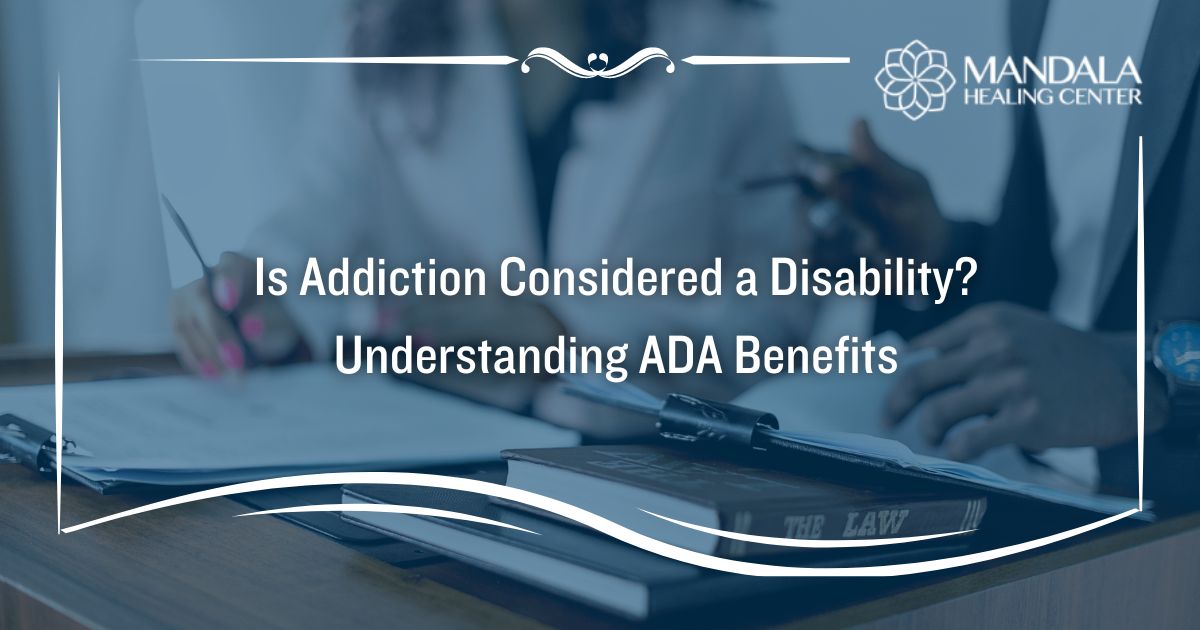Addiction is a chronic and progressive disease that affects millions of Americans each year. According to the Substance Abuse and Mental Health Services Administration (SAMHSA), 48.7 million people struggled with a substance use disorder in 2022.[1]
Whether you are abusing prescription drugs, illegal drugs, or alcohol, addiction negatively impacts every area of your life. It can make it difficult to complete major life activities, like holding a job or caring for your health. For these reasons, addiction is a medical condition that qualifies for specific disability benefits.
The Americans With Disabilities Act (ADA) is a federal civil rights law that grants protection for individuals with disabilities from discrimination in many areas of life.[2] It can help people obtain employment, secure healthcare, and obtain public accommodation. The ADA covers both physical and mental disabilities.
Thankfully, addiction is considered a disability under the ADA. This means that the ADA will protect you from being discriminated against due to a substance use disorder when you seek employment. It also ensures that you receive necessary medical treatment and accommodation like a leave of absence from work to attend rehab.
In this article, you will learn:
- What is the ADA
- Does the ADA consider addiction as a disability
- What benefits does the ADA offer for substance use disorders
What is the Americans With Disabilities Act (ADA)?
The Americans With Disabilities Act is a law that ensures people with disabilities get the same rights as everyone else. It allows disabled individuals to secure employment, receive healthcare, and participate in government programs without discrimination.
If someone violates the ADA, they can receive several consequences, including fines, lawsuits, and settlements. These repercussions make it harder for people and organizations to discriminate against individuals with disabilities.
An example of violating the ADA would be refusing to hire a person simply because of their disability. Another example would be a boss telling their employee that they cannot have time off to seek treatment for a disability that requires support.
Is Addiction a Disability Under the ADA?
Under the ADA, a person with a disability is someone who:[2]
- Has a mental or physical impairment that limits one or more major life activities
- Has a history or a record of impairment
- Is perceived by others as having such an impairment
To understand what qualifies as a disability, you need to know what the ADA means by a “major life activity.” This could include eating, sleeping, walking, or breathing. It could also mean trouble with movements, cognitive function, and completing tasks like working or communicating.
Thankfully, addiction is considered a disability under the ADA. Because addiction can make it difficult for a person to complete personal hygiene tasks, hold a job, or function in their daily life, the ADA offers protections for substance use disorders.
Other examples of disabilities covered by the ADA include, but are not limited to:
- Diabetes
- Post-traumatic stress disorder (PTSD)
- Cancer
- Autism
- HIV
- Deafness or hearing loss
- Blindness or low vision
- Epilepsy
- Mobility or intellectual disabilities
- Major depressive disorder (MDD)
- Traumatic brain injury (TBI)
- Cerebral palsy
How Does the ADA Benefit Addiction?
The ADA protects and benefits people with addiction or in recovery in a variety of ways, including:
Employment
Let’s say you want to get a job but you have a history of addiction. The ADA makes it illegal for your potential employer to ask about whether you have ever suffered from a substance use disorder. Additionally, you cannot be fired for having a history of addiction.
The only instance in which the ADA does not protect you is if you fail a drug test. Your employer is allowed to drug test you if they suspect substance abuse. If you fail, they are allowed to terminate your employment.
Accommodations
The ADA requires that employers offer reasonable accommodations for people with addiction. For example, if you need a modified work schedule or unpaid leave to attend addiction treatment, your employer is required to allow it.
This means that you cannot get fired from your job simply because you need help for addiction. By doing this, the ADA has broken one of the most common barriers that people seeking help for addiction face. Now, you can rest assured that you will not lose your job when you go to rehab.
Health Services
The ADA has made it illegal for people with addiction to be denied health services related to addiction recovery. This means a doctor or an insurance company cannot tell you that addiction treatment is not a necessary health care benefit.
It is also important to note that the ADA protects people who are taking prescription medication to treat their addiction. For example, some people with alcohol or opioid use disorder take medications like Suboxone or methadone, which limits cravings. As long as your medication is doctor-prescribed, you cannot be discriminated against for taking it.
Find Help for Drug Addiction and Alcoholism
If you or a loved one suffers from addiction, it’s time to seek professional help. Thankfully, the ADA prevents your employer from firing you when you need time off to seek addiction care. This means you will not lose your job if you decide to get the help you need.
At the Mandala Healing Center, we offer evidence-based treatment for substance use disorders. We will provide medical detox, behavioral therapies, and relapse prevention planning. These services help you address the root causes of your addiction rather than just treating the symptoms.
Contact us today for more information on our drug and alcohol rehab program.
References:
- The Substance Abuse and Mental Health Services Administration (SAMHSA): HHS, SAMHSA Release 2022 National Survey on Drug Use and Health Data
- The U.S. Department of Justice Civil Rights Division: Introduction to the Americans with Disabilities Act












